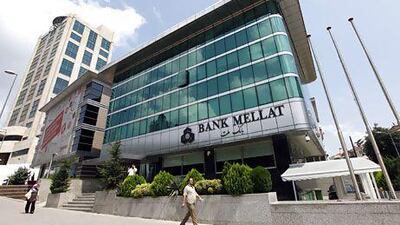The United Kingdom government is seeking to renew sanctions against Iran's largest private bank, despite Britain's Supreme Court finding no evidence Bank Mellat had helped to fund Iran's nuclear programme.
Last month nine UK senior judges ordered the sanctions against the Tehran-based lender be removed after labelling the measures as "irrational". But Britain's treasury is now seeking to reinstate the listing through European Union courts. The treasury is attempting to intervene in the EU Council's appeal against an earlier decision by the EU General Court to declare EU sanctions against Bank Mellat as unlawful.
"The treasury's evidence has been found wanting by the highest court in the UK. These continued actions at the EU are an attempt to maintain sanctions against Bank Mellat by the back door," said Sarosh Zaiwalla, senior partner at Zaiwalla & Co, Bank Mellat's London law firm.
It is requesting the European Court of Justice to strike out the treasury's intervention.
Bank Mellat has branches in Turkey, South Korea and London. The lender has a presence in Dubai through Persia International Bank, Bank Mellat's 60 per cent-owned subsidiary. The assets of the branch, along with Bank Mellat's global assets, were frozen in 2010 as a result of EU sanctions.
Bank Mellat was first put on the UK sanctions list in 2009.
As a result of the loss at the Supreme Court, the UK government already faces a bill of several hundred million pounds in damages that Bank Mellat is seeking for loss of business. Further delay at the European Court is likely to increase this sum, said Zaiwalla & Co.
The European General Court told governments in the EU last January to ease asset freezes against Bank Mellat and Bank Saderat, ruling that the EU had failed to provide sufficient evidence the banks were involved in financing Iran's nuclear programme. The EU Council had appealed that decision.

